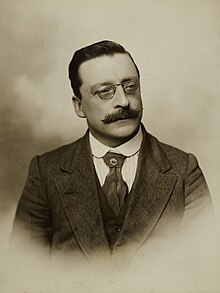Arthur Griffith
| Arthur Griffith | |
|---|---|
 |
|
| President of Dáil Éireann | |
|
In office 10 January 1922 – 12 August 1922 |
|
| Preceded by | Éamon de Valera |
| Succeeded by | W. T. Cosgrave |
| Constituency | Cavan |
| Minister for Foreign Affairs | |
|
In office 26 August 1921 – 9 January 1922 |
|
| Preceded by | Count Plunkett |
| Succeeded by | George Gavan Duffy |
| Personal details | |
| Born |
31 March 1872 Dublin, Ireland |
| Died | 12 August 1922 (aged 50) Dublin, Ireland |
| Nationality | Irish |
| Political party | Sinn Féin |
| Spouse(s) | Maud Sheehan Griffith |
| Children | 2 |
| Religion | Roman Catholicism |
Arthur Griffith (Irish: Art Ó Gríobhtha; 31 March 1872 – 12 August 1922) was an Irish politician and writer, who founded and later led the political party Sinn Féin. He served as President of Dáil Éireann from January to August 1922, and was chairman of the Irish delegation at the negotiations in London that produced the Anglo-Irish Treaty of 1921.
Arthur Griffith was born at 61 Upper Dominick Street, Dublin, Ireland on 31 March 1872, of distant Welsh lineage, and was educated by the Irish Christian Brothers. He worked for a time as a printer before joining the Gaelic League, which was aimed at promoting the restoration of the Irish language.
His father had been a printer on The Nation newspaper — Griffith was one of several employees locked out in the early 1890s due to a dispute with a new owner of the paper. The young Griffith was a member of the Irish Republican Brotherhood (IRB). He visited South Africa from 1897 to 1898, after the defeat and death of Charles Stewart Parnell whose more moderate views he had initially supported, while recovering from tuberculosis. There he supported the Boers against British expansionism and was a strong admirer of Paul Kruger.
In 1899, on returning to Dublin, he co-founded the weekly United Irishman newspaper with his associate William Rooney, who died in 1901. On 24 November 1910, Griffith married his fiancée, Maud Sheehan, after a fifteen-year engagement; they had a son and a daughter.
Griffith's fierce criticism of the Irish Parliamentary Party's alliance with British Liberalism was heavily influenced by the anti-Liberal rhetoric of Young Irelander John Mitchel. Griffith made a number of highly controversial statements and opinions. He defended anti-semitic rioters in Limerick, and denounced socialists and pacifists as conscious tools of the British Empire. Griffith also supported movements seeking national independence from the British Empire in Egypt and India and wrote a highly critical description of the British government action at Matabele. Despite his opposition to communism and socialism, he sometimes worked with James Connolly, who also supported Irish nationalism.
...
Wikipedia
